
Dr Binayak Sen has given a double blow to the state administration of Chattisgarh. First, the Supreme Court rejected the sedition charges levelled against him for which the state courts found him guilty. And then he was appointed to the 40-member steering committee on health in the planning commission.
The Chattisgarh government has been vocally protesting against Sen's appointment, saying that he still remains a convict out on bail and should not be a member of any national-level forum
In this interview with rediff.com's Sahim Salim, Sen, who has just returned from South Korea where he was awarded the prestigious Gwangju Prize for Human Rights, says that the sedition laws, for which he was charged and found guilty by the state, in this country need to be repealed as they "impede the progress of democracy in this country."
Talking about the malnutrition, Sen says, " we are living in a situation, where we are practically walking through time with famine on our side."
Click on NEXT to read the interview...
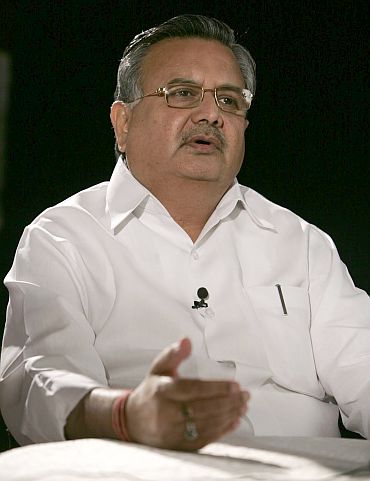
The Chhattisgarh government continues its campaign against you. Chief Minister Raman Singh has opted out of planning commission meetings because of your inclusion. He has even written to Prime Minister Manmohan Singh seeking his intervention. What are your comments on this?
See, my nomination to the special committee on health was not at my instance; it was at the instance of the planning commission. So whatever problems Raman Singh may have against this is between him and the planning commission and he may take it up with them; I have nothing to do with it.
Were you yourself surprised at your appointment?
Well, I have been working in the area of political economy of health for a long time. So, from that point of view it is not a surprise. But certainly, I am obliged to the planning commission for having considered my advice to be in accordance to their objectives. And I am grateful to the planning commission for including my name to the list.
Now that you are in the planning commission, what do you propose to do?
I have not attended a single meeting so far. A meeting was supposed to be held on May 26, but it has been postponed to sometime in June. So, I will be able to make an estimate of what is required of me only after attending the meeting.
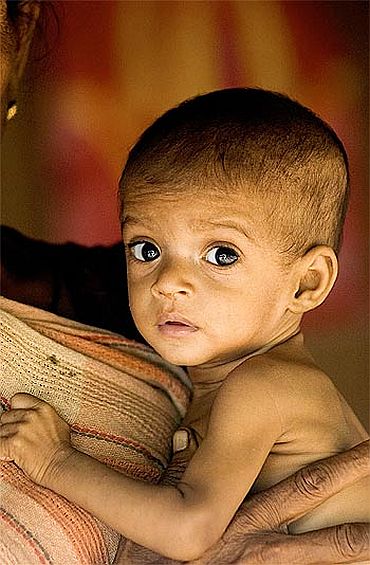
You have been vocal about India's health care sector. Can you tell us in brief the problems India face in this particular sector?
It is very difficult to pinpoint particular problems because it is a very vast subject. Recently, the World Health Organisation appointed a committee on the social dimensions of health, which was chaired by Michael Marmot.
The Marmot committee considered the health of societies all across the world. They came to the conclusion, in what was expressed almost like a slogan, that inequities are killing people on a grand scale. I think that applies to the situation in India. The promotion of equity, both in general and specifically in the area of healthcare, is something that is extremely important.
You recently said that public health infrastructure is very essential to India...
You see, health infrastructure is just one aspect. We can start with the problem of availability of portable water and sanitation. Most importantly, there is widespread malnutrition in this country.
One third of our babies are born light for date. 47 per cent of our children under the age of 5 are malnourished by weight-for-age criteria. The National Nutrition Monitoring Bureau tells us that 37 per cent of the adult population of India has a Body Mass Index of 18.5, which is indicative of chronic under-nutrition.
If you disaggregate this figure, 50 per cent of the Scheduled Tribe and 60 per cent of the Scheduled Caste and large section of the minority population, according to the Sachar Committee report, are malnourished.
So, we are living in a situation, where we are practically walking through time with famine on our side. This is a dangerous situation for the country to be in.
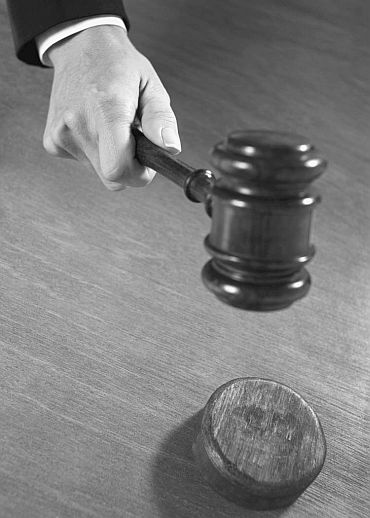
Let us talk about your criticism of the sedition law. Do you think that the government uses it to silence criticism?
Yes, I have criticised the law, but I am not alone in this. Law Minister Veerappa Moily has said that we have to reconsider the sedition laws.
After the Supreme Court expressed the opinion that the state could not produce evidence of sedition in my case, Moily said the laws relating to sedition would have to be reexamined. So, it is not just me, there are far more important people who say this.
There are certainly hundreds of people, probably even thousands -- we don't even have the exact figures -- who are in jail, charged with these sedition related laws. The Public Union for Civil Liberties has just completed a national consultation on sedition related laws.
Eminent jurists, who were part of the consultation, said that sedition laws in its present condition are unworthy of a free citizenry of a free country! They opined that these were hold-overs from our colonial past; even Mahatma Gandhi was charged and convicted with sedition. The sedition laws do not reflect a democratic polity.
So, whether the government is using these laws to silence criticism or not, is a matter for evaluation. But I think enough has been expressed on the nature of the sedition laws to make it important enough to question its role in a democratic society.
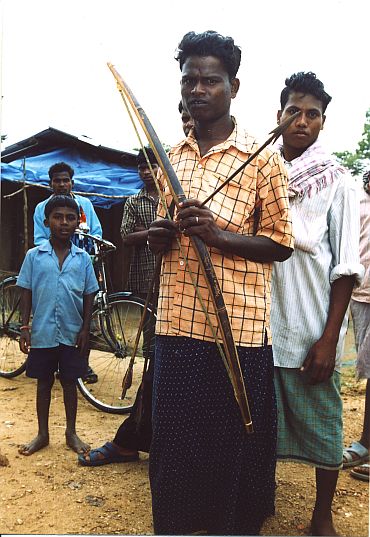
So are you saying that it is just outdated and need to be modified to serve the current social setup?
No, it is not just outdated. I think that the nature of these laws is such that they impede the progress of democracy in this country.
Tell us a little about the PUCL's work against the Salwa Judum. Did your imprisonment affect the PUCL's attempts to bring out the human rights violations carried out against the Naxalites?
See, the PUCL had investigated the Salwa Judum and the investigations concluded that it was not a spontaneous movement of the tribals as it was made out to be. Rather, it was initiated, financed, planned and executed by the government.
Part of the Salwa Judum movement was the preparation of armed vigilante forces. Now, the Supreme Court has expressed itself very clearly against both the Salwa Judum and the arming of private vigilante forces.
As far as the PUCL is concerned, it is made up of a large number of dedicated individuals and I am only one among them. So the PUCL's work was never affected.
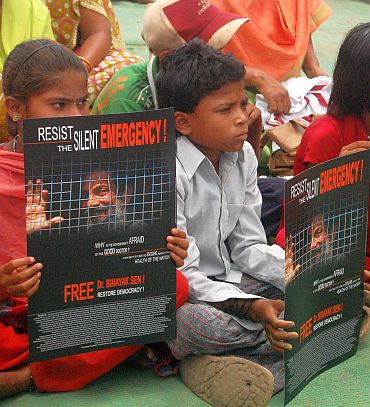
Talking about the 'Save Binayak Sen campaign', what do you make of the sheer magnitude of the support you received?
Actually, I was not surprised by the support, but I was extremely grateful for it. I think it is not reflective of my own importance. It reflects the tremendous concern that people all across the country feel at the current juncture at our political life as a nation.
The last few days I have been at Kolkata and there has been an overwhelming interest, both from the media and the general citizens in the kind of problems we have been encountering in the course of our work against human rights violations.
Recently, I addressed a meeting in the University Institute in Kolkata, which is a large hall with a seating capacity of 900 and there was not even standing room left in the hall. This is not because of what a great person Binayak Sen is, but because the people are extremely worried about the kind of situation that our country is currently in.

The state went to great lengths to mount a legal campaign against you. They talked about incriminating documents and your visits to Narayan Sanyal. What are your comments on the fact that none of these allegations held water at the Supreme Court?

What are the incriminating documents the state keeps referring to?
There is one document they have referred to, which is patently a fake document and it was planted.
All the documents the state legitimately seized don't show evidence to any links. And all of these documents have my signature on them. The only document, which purportedly shows my links does not have my signature. The explanation provided by the prosecutor for it not having a signature was that it somehow got stuck to the other documents!
This is the kind of ridiculous explanations offered as a part of a serious prosecution.
Not only that, please look at the testimony Mr (BBS) Rajput, the senior investigating officer in the case. When my bail was being considered, he stated on the affidavit in the Supreme Court that other co-accused were arrested from Mahindra Hotel, but the main prosecution case stated that he was arrested from the station road.
When he was asked about this discrepancy, he said that the use of the place "Mahindra Hotel" in the Supreme Court affidavit was actually a typographical error! If these people are so cynical of their own statements, how can one take their prosecution case seriously?
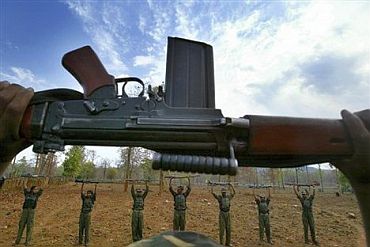
You have been vocal about state's way of handling Naxal activities in India? What, in your opinion, is the ideal way to go about it?
I am not an expert on the phenomenon of Naxalism. We are just against violence of all shapes. We are against the violence of the state and against the violence of the non-state actors. We have stated our opposition to violence clearly and ambiguously on many occasions.
But we also say that the whole phenomenon of structural violence should be addressed -- wide spread malnutrition and the displacement of malnourished communities from their resource base, putting their survival at risk. This raises a question of the survival of these communities, which the state has to answer.
I am absolutely certain that a dialogue process is the only way out of this situation. Dialogue is also what we have been trying for to find a way out of this.